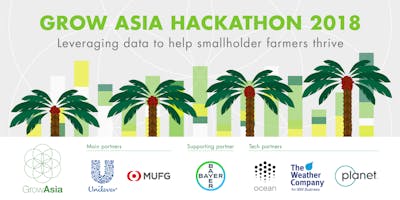Grow Asia Hackathon 2018
Digitisation has the potential to revolutionise the way 100 million smallholder farmers in Southeast Asia manage their plots and crops.
Oil palm cultivation has become important to rural livelihoods in Indonesia, with about 40% of the total oil palm area in the country owned / managed by smallholder farmers ("smallholders"). As the palm oil ecosystem transitions to a more sustainable value chain, it is critical that smallholders become key players in the process.
The Grow Asia Hackathon 2018 (20-21 April) aims to uncover data-enabled solutions that give smallholders better access to information, credit, and services that will help improve their livelihood, and drive sustainable outcomes. We aim to address gaps in data, reduce information asymmetry, and demonstrate how using datasharing can be done at scale.
Whether you're a developer, data analyst, sustainability expert, or entrerpreneur, we want you to join us at the Grow Asia Hackathon, and use your skills to build solutions that will positively impact the lives of smallholders!
Programme
Kick-off: Friday, 20 April
- Recap of Hackathon Challenge Statements
- Datasets and Resources
- Hackathon Processes and Details
- Team Formation
- Ideation
Work Day: Saturday, 21 April
- Work Time
- Consultations with Subject Matter Experts
- Mentor Consultations
- Technical Consultations with The Weather Company
- Pitch Practice Clinics
Pitch Day: Monday, 23 April
- Final Presentations
- Judges' Deliberations
- Results Announcement
- Prize Ceremony
Challenges
1. Data sharing: Data sharing - Many companies are addressing the issue of “traceability” - collecting, recording and analysing data on the plantations, farmers, and middlemen.
- How might we design a data application or platform and appropriate business models for the mutual benefit of the ecosystem actors and smallholders?
2. Productivity: Low productivity is a key factor leading to smallholders growing larger areas of under-productive oil palm rather than intensifying production. The single most essential activity to increase smallholder productivity and efficiency is technical training and assistance.
- How might we provide the right information and training to smallholders, improving productivity and aiding in sustainable intensification of plantations?
3. Financing: Smallholders are often too small for commercial banks and too large for micro-finance schemes. They do not have credit history and cannot supply reliable management information to access finance. Their only option is to access informal credit, which comes with high interest terms and short tenure.
- How might we devise a new credit scoring mechanism for financial institutions to extend credit, and allow for incorporation sustainable practices along with this finance?
4. Logistics: Smallholders who do not have their own means of transport rely on local traders or the closest mill and are subject to unforeseen weather conditions.
- How might we improve the timeliness of information and coordination of transportation options, so smallholders can make informed decisions?
Learn more about the challenges here.
Why You Should Join
- Learn more about the issues surrounding oil palm cultivation and the ecosystem, and the challenges faced by smallholder farmers!
- Pitch your solutions to leaders from key ecosystem partners.
- Win from a prize pool of $11,000 and an equivalent amount of Ocean Protocol Tokens! Also stand a chance to be featured at the prestigious Grow Asia Forum!
Don't forget to check out the Pre-Hackathon Workshop (12 April), where you can get a head-start by learning about the palm oil ecosystem from stakeholders and experts, and find out about challenges that smallholder farmers face! Also, you might meet like-minded innovators and entrepreneurs to team up with!
If you have any questions, drop us an email at info@padang.co.
